-
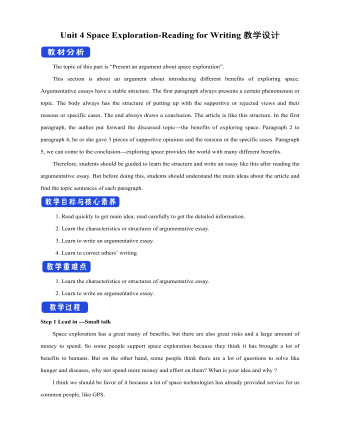
新人教版高中英语必修3Unit 4 Space Exploration-Reading for Writing教学设计二
⑦在我看来, 探索太空是值得的。As far as I am concerned, it is worthwhile to explore the space.Step 10 Writing---draftRecently, students in our class have had heated a discussion on whether space is worth exploring. Students hold different ideas about it.30% of us think space exploration is not worthwhile. They think space is too far away from us and our daily life and is a waste of money. And the money spent on space exploration can be used to solve the earth’s problems such as starvation and pollution.On the other hand,70% think space is worth exploring because we have benefited a lot from it,such as using satellites for communication and weather forecast. What’s more,with further space research,we may solve the population problem by moving to other planets one day. Also,space research will enable us to find new sources to solve the problem of energy shortages on the earth.As far as I am concerned, it is worthwhile to explore the space. Not only can it promote the development of society but also enrich our life. Step 11 Pair workExchange drafts with a partner. Use this checklist to help your partner revise his/her draft.1.Does the writer explain why he/she changed/wanted to change?2.Does the writer tell how the changes have improved or will improve his/her life?3.Is the text well-organised?4.Does the writer use words and expressions to show similarities and differences?5.Are there any grammar or spelling errors?6.Does the writer use correct punctuation?
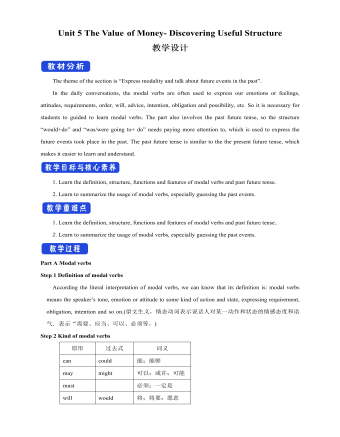
新人教版高中英语必修3Unit 5 The Value of Money- Discovering Useful Structure教学设计
Step 3 Meaning1. 过去将来时表示从过去某一时间来看将要发生的动作或存在的状态, 常用在宾语从句中。一般由“would/should +动词原形”构成。She hoped that they would meet again someday. 她希望将来有一天他们能再见面。2. was/were going to+动词原形: 表示过去将要发生或很有可能发生的动作, 常用于口语中, 表示预言、意图或者打算等。He was going to start work the following week. 他打算下星期开始工作。3. was/were about to do: 常用来表示即将发生的动作, “刚要/正要做……”。注意该结构不与任何时间状语连用。I felt that something terrible was about to happen. 我感到某种可怕的事情即将发生。4.was/were to do: 表示“曾计划做某事”, 如果表示“本来计划做某事, 动作没实现”, 则需用 “was/were to have done”。She said she was to have told me about the accident. 她说她本来想告诉我关于事故的事。5.Start, go, come, leave, see, meet等动词的过去进行时: 表示就过去某一时刻而言即将发生的动作。She was coming later. 她随后就来。I had just put on my overcoat and was leaving to visit a friend of mine. 我刚穿上外套要去看我的一个朋友。
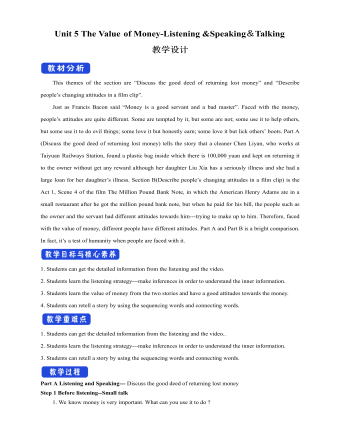
新人教版高中英语必修3Unit 5 The Value of Money-Listening &Speaking&Talking教学设计
4. A:We’d like to have someone to say a word at the beginning to welcome the group.B:↙Who?A:We thought that you or Dr.Johnson might do it.B用降调说Who,其意思是问,对方想让谁在开场时致欢迎词。Step 6 Pronunciation---Practice1. Listen to the short conversation and mark the intonation with ↗, ↙ or ↙, ↗. Then discuss with a partner what they intend to convey by using different intonation.Owner: You know what ?↗ It’s a million-pound bank note↙.Waiter 1: Really ?↗(question)Waiter 2: Really !↙(unbelievable and surprised)Waiter 3: Really ?!↙↗(first question then surprised)2. Listen to the conversations. Underline the parts that are stressed and mark the intonation. Then talk about the implied meanings of the responses with different intonations. Listen again and repeat.1) Henry: It’s a nice suit.Owner: Oh, it’s perfect!↙(The intonation means it is very suitable for Henry.)2) Henry: Well, that’s very kind of you.Owner: Kind, sir ?↗(what you said is not right) No, it’s kind of you. You must come whenever you want and have whatever you like. Just having you sit here is a great honour !!↙(welcome you to come again)3)Henry:Well, to be honest, I have none. Oliver:(happily) What luck!(excited) Brother↗, what luck!↙(It means “Didn’t you hear it?”)Henry: Well, it may seem lucky to you but not to me!↗(angry) If this is your idea of some kind of joke, I don’t think it’s very funny. Now if you’ll excuse me, I ought to be on my way.↙(If so, I would leave.)Roderick: Please don’t go↙...(hope Henry can wait for a moment)Part B Viewing and Talking---Describe people’s changing attitudes in a film clipStep 1 Before-listening---Tell the filmYou are going to watch part of the film The Million Pound Bank Note. Look at these photos and guess what happens in the film.
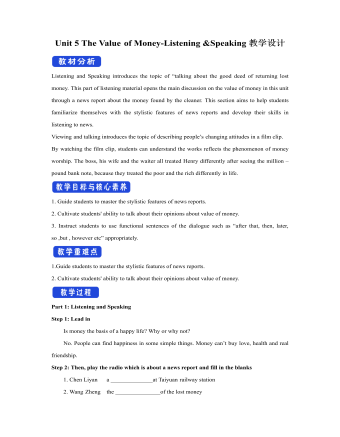
新人教版高中英语必修3Unit 5 The Value of Money-Listening &Speaking教学设计
Step 4: Listen again and decide if the following statements are true (T) or false (F).1 It was the first time Chen Liyan's story was reported. T口 F口2 Chen found 10,000 yuan in a small plastic bag in Taiyuan railway station口 F口3 Wang Zheng apologized to Chen because he couldn't offer her more money. T口 F口4 Chen took out a large loan to cure her daughter, T口 F口5 Wang set up a fundraising website for Chen's daughter after Chen told him about her situation. T口 F口Step 5:After listening, discuss the questions.1 What kind of person do you think Chen Liyan is?Chen Liyan is generous and honest because she returned a large sum of money to the owner.2 Did Chen return the money because she didn't need it?No. She returned the money because it was the right thing to do. Evidence for this is that she refused to accept the reward money because she felt that it had not been earned. 3 Is it common for people to do what Chen did?It depends on the culture. In some countries it is quite common to return money that has been found. In other countries, people believe "Finders are keepers!" 4 How did Wang Zheng feel about the return of his money?He must have been very happy and relieved to have gotten his money back. We know this because he thanked Chen repeatedly and even offered her a reward.5 Why did Ma Dongbao tell Wang about Chen's family?He must have had great sympathy for Chen and her daughter and wanted to help them.'We know this because he arranged help for them. 6 How did the news reporter feel about Chen's actions?The news reporter felt that it showed that money wasn't the most important thing in life. We know this because the reporter told us that this is what Chen believes. and then said, “that's a great attitude to take."
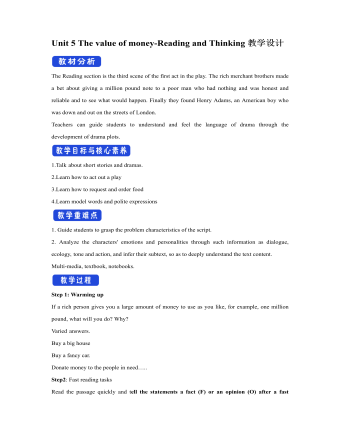
新人教版高中英语必修3Unit 5 The value of money-Reading and Thinking教学设计二
? Could you offer me some kind of work here?? I don’t want your charity, I just want an honest job.? Careless: I landed in Britain by accident.Step 7:Consolidation.? Find Henry? Roderick and Oliver were I .making a bet when they saw Henry, a poor young man. ? Know Henry? About a month ago, Henry was sailing and later he found himself carried out to sea by a strong wind. Fortunately, he 2.was spotted by a ship. And it was the ship that brought him to 3.England? Offer money to Henry ? Oliver and Roderick gave Henry a letter and told him that there was money in it. They 4.persuaded him to accept it, and made him 5.promise that it wouldn't be opened until 2 o'clock.Step 8:Language pointsa large amount of: a large quantity of; a great deal ofe.g. They bought a large amount of furniture before they moved their new house.make a bet: make an arrangement to risk money, etc. on an event of which the result is doubtful.e.g. We made a bet on the result of the match.permit sb to do something: allow somebody to do somethinge.g. My mother doesn’t permit me to ride in the street after it rained.by accident: as a result of chancee.g. I only found it by accident.stare at: look at somebody or something with the eyes wide open in a fixed gaze( in astonishment, wonder, fear, etc)to be honest: to tell you the truth; to be franke.g. To be honest, I don’t think we have a chance of winning.Step7 Homework:What do you think will happen to Henry? Will the bank-note help him or get him into trouble?
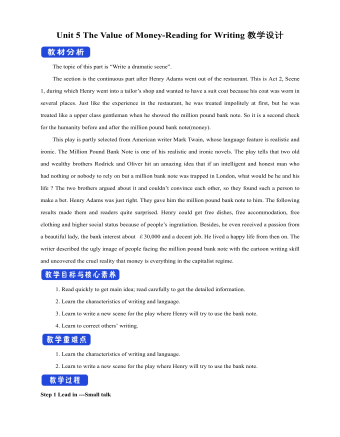
新人教版高中英语必修3Unit 5 The Value of Money-Reading for Writing教学设计二
2. 您能看到, 我头发太长了。You can see that my hair is much too long.3. 无论什么时候, 只要您想回来就回来。Please come back whenever you want.4. 您仅有很少的头发要理! You only have too little hair to cut !5. 为您服务是我的荣幸!It is my honour to serve you!Step 9 Writing(Henry is walking down the street when he sees a sign for a place that cuts hair. He decides to have it cut. )H=Henry B=BarberH: Good afternoon, I’d like to have my hair cut, if I may. (The barber looks at Henry’s hair and continues cutting another man’s hair. ) Er, I’d really like a haircut. As you can see it’s much too long. B: (in a rude manner) Yes, I can see that. Indeed, I can. H: Fine, well, I’ll have a seat then. (He sits in one of the barber’s chairs. The barber turns to look at Henry. )B: It’s quite expensive here, you know! Are you sure you can afford it?H: Yes. I think so. (After his hair is cut, the barber tells Henry how much he must pay. Henry shows the barber the bank note. )B: Why Mr. . . (looks shocked)H: Adams. Henry Adams. I’m sorry. I don’t have any change. B: Please don’t worry! (wearing a big smile) Nothing to worry about! Nothing at all! Please come back whenever you want, even if you only have too little hair to cut! It will be my honour to serve you!Step 10 Pair workExchange drafts with a partner. Use this checklist to help your partner revise his/her draft.1. Are all the elements of a play included and in good order ?2. Do the character use suitable language ?3. Are the stage directions clear and useful ?4. Is the plot clear and exciting enough ?
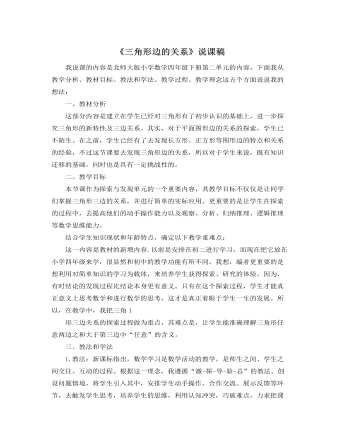
北师大版小学数学四年级下册《三角形边的关系》说课稿
首先出示一些生活中常见的图片,让学生通过欣赏,发现图片里面的三角形,为学生创设情境,从而引出本节课的主角----三角形。然后让学生回忆什么样的图形是三角形?使学生在头脑里迅速的呈现出三角形的概念“由三条线段首尾连接围成的图形叫三角形”。在此强调“首尾连接”。这样由三角形的定义再现三角形的表象,明白三角形围摆的要求,避免学生在操作过程中出现过失性的错误。紧接着抛出一个问题,制造一个问题情境“给你三条线段,你一定能围成一个三角形吗?”对于这个问题,学生可能会做出各种猜测,但我不作任何表态。我利用学生思维中可能出现的错误,创设了这样一个认知矛盾的冲突。因为学生原本以为只要有三条线段,就能围成三角形,但通过老师的演示和自己动手操作,发现并不是有三条线段就能围成三角形,使学生的认知结构受到了严重的冲击,自然而然的引出要解决的问题:那三角形三边有什么关系?并板书课题。第二个环节,实验操作,积累研究的材料。
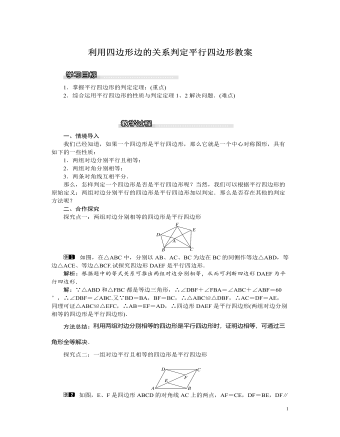
北师大初中八年级数学下册利用四边形边的关系判定平行四边形教案
解:四边形ABCD是平行四边形.证明如下:∵DF∥BE,∴∠AFD=∠CEB.又∵AF=CE,DF=BE,∴△AFD≌△CEB(SAS),∴AD=CB,∠DAF=∠BCE,∴AD∥CB,∴四边形ABCD是平行四边形.方法总结:此题主要考查了平行四边形的判定,以及三角形全等的判定与性质,解题的关键是根据条件证出△AFD≌△CEB.三、板书设计1.平行四边形的判定定理(1)两组对边分别相等的四边形是平行四边形.2.平行四边形的判定定理(2)一组对边平行且相等的四边形是平行四边形.在整个教学过程中,以学生看、想、议、练为主体,教师在学生仔细观察、类比、想象的基础上加以引导点拨.判定方法是学生自己探讨发现的,因此,应用也就成了学生自发的需要,用起来更加得心应手.在证明命题的过程中,学生自然将判定方法进行对比和筛选,或对一题进行多解,便于思维发散,不把思路局限在某一判定方法上.
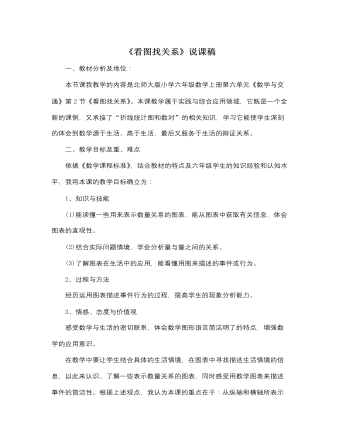
北师大版小学数学六年级上册《看图找关系》说课稿
(2)结合实际问题情境,学会分析量与量之间的关系。(3)了解图表在生活中的应用,能看懂用图来描述的事件或行为。2、过程与方法经历运用图表描述事件行为的过程,提高学生的现象分析能力。3、情感、态度与价值观感受数学与生活的密切联系,体会数学图形语言简洁明了的特点,增强数学的应用意识。在教学中要让学生结合具体的生活情境,在图表中寻找描述生活情境的信息,以此来认识、了解一些表示数量关系的图表,同时感受用数学图表来描述事件的简洁性。根据上述观点,我认为本课的重点在于:从纵轴和横轴所表示的意义来认识图表,并能从图表中获取信息。难点则是:怎样看图,如何用语言去描述事件发生的过程。新时代的课堂,是信息技术的课堂,因此本节课我设计了一个多媒体课件予以辅助教学。
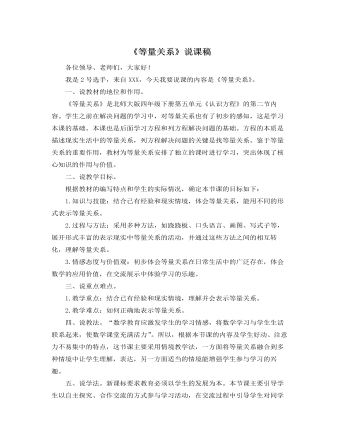
北师大版小学数学四年级下册《等量关系》说课稿
一、说教材的地位和作用。《等量关系》是北师大版四年级下册第五单元《认识方程》的第二节内容。学生之前在解决问题的学习中,对等量关系也有了初步的感知,这是学习本课的基础。本课也是后面学习方程和列方程解决问题的基础。方程的本质是描述现实生活中的等量关系,列方程解决问题的关键是找等量关系。鉴于等量关系的重要作用,教材为等量关系安排了独立的课时进行学习,突出体现了核心知识的作用与价值。二、说教学目标。根据教材的编写特点和学生的实际情况,确定本节课的目标如下:1.知识与技能:结合已有经验和现实情境,体会等量关系,能用不同的形式表示等量关系。2.过程与方法:采用多种方法,如跷跷板、口头语言、画图、写式子等,展开形式丰富的表示现实中等量关系的活动,并通过这些方法之间的相互转化,理解等量关系。
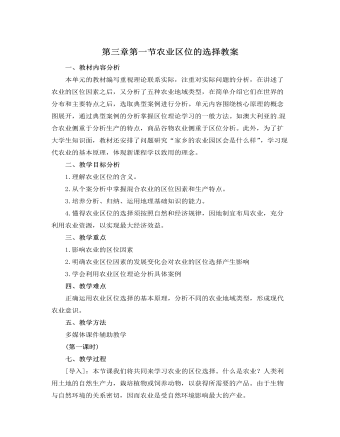
人教版新课标高中地理必修2第三章第一节农业区位的选择教案
1.澳大利亚混合农业地域在生产结构、经营方式、科技应用、农业专业化和地域化等方面有哪些特点?2.在澳大利亚混合农业地 域形成的过程中,有哪些区位因素在起作用?学生发言,教师适当引导、评点并作讲解。[教师提问]:那么,澳大利亚的墨累—达令盆地的区位因素有什么不足之处?知识拓展:课件展示澳大利亚大分水岭的雨影效应的形成原理及东水西调示意图。[教师讲解]:澳大利亚东南部受大分水岭的影响,降水集中于大分水岭的东侧,在其西侧形成山地的雨影效应,降水丰富地区与农业生产地区分布不一致,灌溉成为澳大利亚农牧业发展的限制性条件。因此,澳大利亚对水利工程建设很 重视,东水西调促进了墨累—达令盆地农牧业的发展。[课堂小结]:这节课我们学习了农业区位选择的基本原理。 通过学习我们了解到,农业的区位选择实质上就是对农业土地的合理利用。
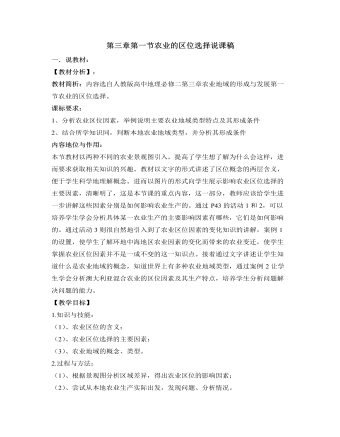
人教版高中地理必修2第三章第一节农业的区位选择说课稿
◆设计意图:培养学生独立思考、合作学习的能力。分别说明市场、交通、劳动力、机械和政策对农业生产的影响,让学生切实地考虑,拓展学生思路。教师激发和维持学生学习动机、引导学生、帮助学生自主发现、探索知识,达到巩固所学知识,检验学生的实践应用能力。D.分析教材,识别图片,理解农业地域阅读、分析教材,看图识别,研究案例《澳大利亚地混合农业生产》、思考问题、解决问题◆设计意图:图片展示能清楚直观地说明问题,通过案例分析,了解澳大利亚的混合农业生产,培养学生独立思考问题、解决问题的能力,开拓学生思路。3.课堂小结:◆设计意图:帮助学生回顾课堂、巩固所学知识。4.反馈练习:◆设计意图:知识与能力强化训练,巩固本课所学知识,提高应用能力。
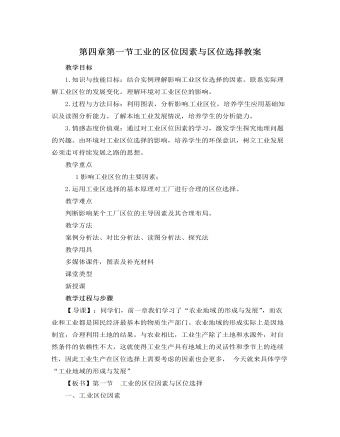
人教版新课标高中地理必修2第四章第一节工业的区位因素与区位选择教案
教学目标1.知识与技能目标:结合实例理解影响工业区位选择的因素。联系实际理解工业区位的发展变化。理解环境对工业区位的影响。2.过程与方法目标:利用图表,分析影响 工业区位,培养学生应用基础知识及读图分析能力。了解本地工业发展情况,培养学生的分析能力。3.情感态度价值观:通过对工业区位因素的学习,激发学生探究地理问题的兴趣。由环境对工业区位选择的影响,培养学生的环保意识,树立工业发展必须走可持续发展之路的思想。教学重点1影响工业区位的主要因素;2.运用工业区选择的基本原理对工厂进行合理的区位选择。教学难点 判断影响某个工厂区位的主导因素及其合理布局。教学方法 案例分析法、对比分析法、读图分析法、探究法教学用具 多媒体课件,图表及补充材料课堂类型
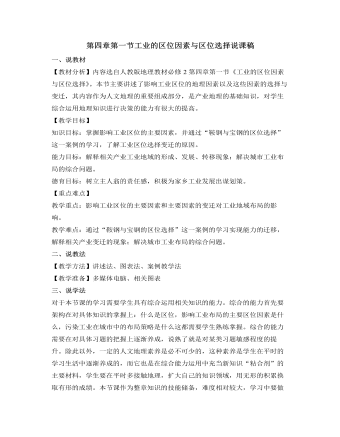
人教版高中地理必修2第四章第一节工业的区位因素与区位选择说课稿
在这段教学中可以插入世界主要铁矿、煤矿,以及我国主要的矿产基地、钢铁生产基地的相关内容,不失为区域地理知识的很好补充和巩固。那么从现状来看我国的钢铁产业基地多数污染较为严重,可见工业区位的选择同样要顾及到环境的因素,由此引入下一部分的内容。除了传统意义上的工业区位因素外,环境、政策以及决策者的理念和心理等日益受到人们的关注。在这段文字的处理上,只需进行概念、道理上的陈述即可,重点要放在污染工业在城市中的布局这一知识点上。首先要了解什么工业会造成怎样的污染,然后根据污染的类别分别讲解不同的应对方略,最后将配以适当的例题以期提高学生的整体把握程度和综合运用能力。最后将对本节内容进行小结,要在小结中阐述清楚本节课的两大内容:即工业的区位因素和工业区位的选择。然后点明本节课的主要知识点、难点、重点。在时间允许的情况下可以适当安排几道有关主导产业和城市工业布局的例题加以练习。
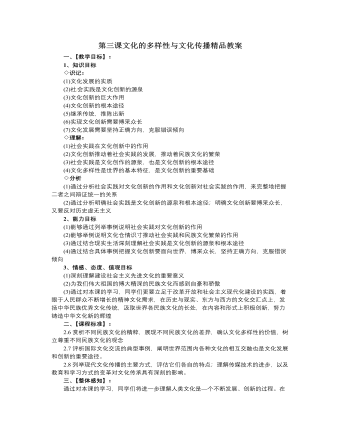
人教版高中政治必修3第三课文化的多样性与文化传播精品教案
◇探究提示:我们可以通过人际交往,阅读报纸、杂志、书籍等,欣赏电视、上网查询、发送手机短信、阅读电子读物等方式来搜集资料。其特点为:人际传播是社会生活中最直观、最常见、最丰富的传播现象,具有传播渠道多、方法灵活、意义丰富、反馈及时的特点。报纸、杂志、书籍等,可以通过扫描、编排处理后,显示在互联网上,供广大读者使用。电视提供了动态画面和缤纷的色彩,使人们对信息的理解变得更生动、形象和真实。互联网具有传播同网、全球同时、受众主动、双向互动的特点。手机短信用精练的语言传达丰富多彩的内容,不仅具有娱乐性,还具有情感性、艺术性耙哲理性,让人回味无穷。电子读物实现了文字、图像、声音的完关结合,使人在看图阅文的同时可以听音乐、写文章、做笔记、复制文件等等。
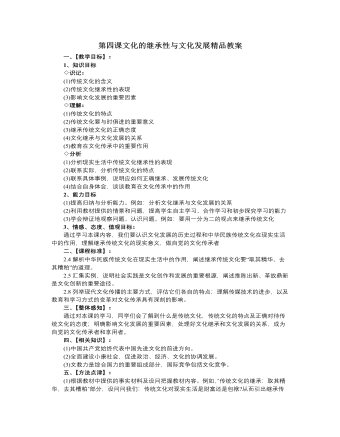
人教版高中政治必修3第四课文化的继承性与文化发展精品教案
◇探究提示:(1)孔子思想体系的核心是“仁’’和“礼”,其主要内容是“仁者爱人”和“克己复礼”。孔子提出“仁”的学说,要求统治者体察民情,反对苛政和任意刑杀;提倡广泛地理解、体贴他人,以此调整人际关系,稳定社会秩序。孔子讲的“克己复礼”,是说做人要克制自己,使自己的行为符合‘‘礼’’的要求。(2)老子认为“道”是凌驾于天之上的天地万物的本原,他提出‘‘天法道,道法自然”的思想。老子从“天道自然无为”的思想出发,倡导政治上“无为而治”,以“无事取天下”。老子哲学中包含着丰富的辩证法思想,他指出,任何事物都有矛盾、对立的两个方面,矛盾双方可以相互转化。(3)墨子主张“兼爱”“非攻”,“兼爱”就是无等差的爱,无论任何人,都不分轻重厚薄;“非攻”就是反对不义的兼并战争,主张各国和平相处。(4)韩非子崇尚法,强调法的重要性,主张法、术、势相结合,建立一个君主专制的中央集权国家,要求人人必须遵守法;韩非子还认为社会不断发展变化,历史永远不会倒退,主张变法革新。
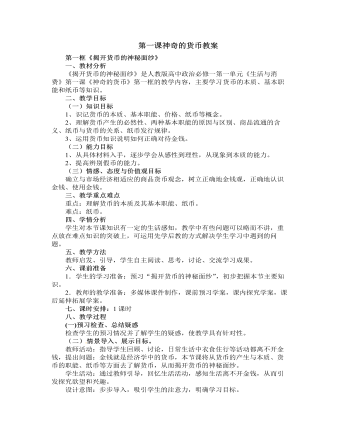
人教版高中政治必修1第一课神奇的货币教案
1、外汇与外币的关系:(1)外汇包括外币,但外汇不等于就是外币。外币是指外国的货币,包括外国的纸币、铸币;外汇通常是以外国货币表示的用于国际间结算的支付手段,具体包括外币、外币有价证券、外币支付凭证等。(2)外币属于外汇的范围,但不能把二者等同起来。通常情况下,只有可以自由兑换的外币才是外汇,因为外汇的实质是国际支付手段,如果某种货币不能自由兑换,它就不能成为国际支付手段。外汇执行的 主要是货币的支付手段的职能。(3)持有外汇意味着对外汇发行国拥有债权。持有外汇过多,一方面意味着国际支付能力强和有可能对外汇发行国施加影响;另一方面则意味着大量该由本国享受的资源,被借给外国利用,并要承担外汇贬值的风险。2、关于币值变化的分析:(1)对货币升值的具体分析:一个国家的货币升值(上浮)后,同量的这种货币能比以前换 取更多的他国货币,买到更多的他国商品。
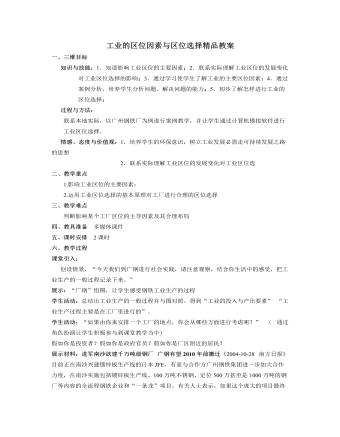
人教版高中地理必修2工业的区位因素与区位选择精品教案
思考:结合资料,看看“广钢”的搬迁还考虑到什么因素?主要从谁的角度去考虑?展示资料:广钢建于1958年,由于城市化进程的加快,原来地处偏僻的广钢一带现已成闹市,广钢因此给周边带来了许多不便,并屡被投诉,投诉的主要内容是烟气、粉尘超标。近日,《珠三角环境保护规划纲要(草案)》(以下简称《纲要》)正式提交省人大常委会审议,按照《纲要》要求,2010年前,广东省将关、停、并、转、迁位于城市中心区高能耗、重污染的工业企业。学生讨论:环保要素、政策要素……从市民、政府等社会角度去考虑板书:2、环保要素 3、政策的变化小结:影响工业区位选择的因素很多,不同的工业区位选择要考虑的主导因素可能是一个或几个,应因地制宜,具体分析。并且影响区位选择的因素随着社会的发展而变化;社会、环境需要对工业区位也有一定的影响力。所以工业区位选择是复杂的,应综合考虑各种因素,以取得最大的经济、社会、环境综合效益。学生活动:计算机模拟工业选址,看谁是最英明的决策者(通过实践应用让学生感受到工业的区位选择应综合考虑)

人教版高中地理必修2工业的区位因素与区位选择教案
⑴ 原料、燃料对工业区位的影响逐渐减弱,市场对工业区位的影响逐渐加强; ⑵交通运输条件对工业具有很大的吸引力,在沿海沿江港口、铁路枢纽、高速公路沿线形成工业区;⑶信息通信网络的通达性作为工业区位的重要性越来越突出;⑷工业对劳动力技能的要求逐渐增强。再次显示上表最后一项“各因素的发展变化”。由工业生产的一般过程中可以知道,工厂产出产品的同时,也产出废气、废水、废渣。这些废弃物排入环境,会造成环境污染,危害人们的身体健康。随着人们环境意识的增强,环境质量已成为重要的区位因素。在工厂的区位选择时,应以不污染当地环境为佳,进行合理选择。读课本61页图4.6污染严重工业的区位选择,思考以下问题:1、严重污染空气的工厂布局时应考虑那些因素?2、严重污染水源的工厂布局时应考虑那些因素?3、对环境质量要求高的工厂布局时应考虑那些因素?教师解析:对这一部分知识需要强记。讲解要注意盛行风向,需结合必修一气候一节将难点突破,可分中国大部分地区、西欧、印度半岛等不同区域进行讲解以加深印象。
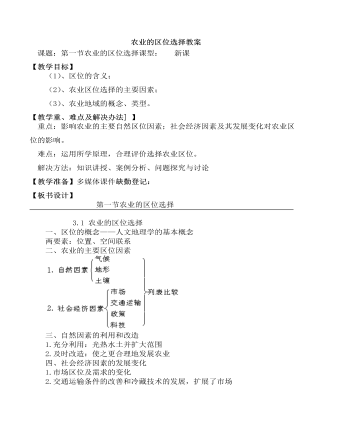
人教版高中地理必修2农业的区位选择教案
【教学目标】 (1)、区位的含义;(2)、农业区位选择的主要因素;(3)、农业地域的概念、类型。【教学重、难点及解决办法] 】重点:影响农业的主要自然区位因素;社会经济因素及其发展变化对农业区位的影响。难点:运用所学原理,合理评价选择农业区位。解决方法:知识讲授、案例分析、问题探究与讨论【教学准备】多媒体课件缺勤登记:三、自然因素的利用和改造1.充分利用:光热水土并扩大范围2.及时改造:使之更合理地发展农业四、社会经济因素的发展变化1.市场区位及需求的变化2.交通运输条件的改善和冷藏技术的发展,扩展了市场





















